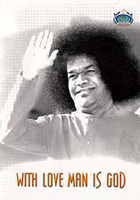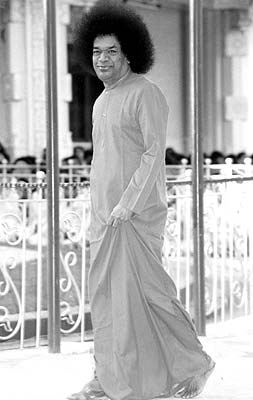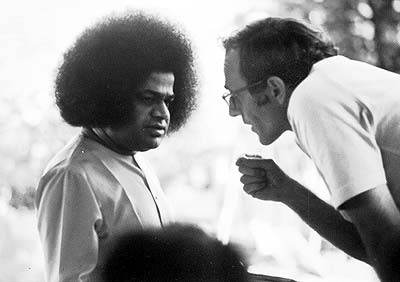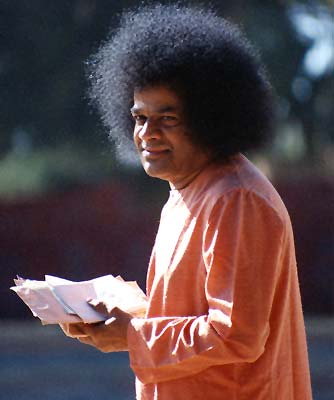 |
 |
 |
Volume
6 - Issue 10
OCTOBER - 2008 |
BEYOND WESTERN PSYCHIATRY….THE BLISS OF ‘SAI’CHIATRY A personal and illuminating
Prof. G. Venkatraman (GV): Sairam and welcome Dr. Sandweiss to the studio of Radio Sai. Well, I must ask you how does it feel to be in our studio? Did you ever dream you would be in such a studio at any time? Dr Samuel Sandweiss (SS): You know it is remarkable coming to see Swami and experiencing His greatness, and to see this studio blossom is extraordinary. It is wonderful to see modern equipment being devoted to such a holy task. GV: You are a product of the West and an academic. You practice medicine, psychiatry, and also are associated with a much respected University. So, the question that most people would like to ask is: how did you come to Swami?
SS: Just a quick side note. I wouldn’t consider myself an academic; I am not an intellectual in that sense, nor do I spend much time teaching. I am inquisitive and thoughtful. I thought a lot about Swami, His relationship to western behavioral sciences and psychiatry. But, I wouldn’t consider myself an academic. How did I come to Swami? Probably it’s hard for me to understand from this life. So, one must posit that there would have been other lifetimes that prepared me because here I am, though apparently stuck in a western culture. GV: You know you are the first person I have heard say that (chuckles). SS: Well, it is probably because I cannot understand why I would have the good fortune; especially because I am coming from the west where this kind of thinking is not well recognised. In western psychiatry, it is quite unusual to think this way, to ponder about vedantic thoughts. But from very early on, I was interested in enquiry such as ‘Why am I alive? Why this world? And why am I in such an extraordinary game?’ It just did not seem as if it were a natural thing. I was amazed at it all the time. GV: At what period of your life was that? SS: I think very early. I could remember walking down the street at about 11 or 12 years old thinking about these questions. GV: Oh! As early as that, that’s very unusual. SS: Well, I don’t know. Children are very innocent and pure, maybe at an early age they (children) do have thoughts like this and then they are educated out of them (laughs). GV: (laughs)… That’s a good one! SS: So, this idea of what is the purpose of life naturally led me to read spiritual books. I was very interested in saints and sages, and the level of knowledge that they had, which was beyond general worldly knowledge. Since I was born into a medical family and it was our tradition to go into medicine, I found an area that was closest and that would allow me to think about spiritual matters, and that was psychiatry.
After 9 years in the practice of psychiatry, I could see that the question I was asking was not answered in any field of psychiatry. So, I began to ask a question to people: “Have you ever seen a miracle?” I had heard enough theory and ideas, and I just wondered “Is there anybody who knows anything at a higher level and can show it by some kind of manifestation of something?” So, that is how I was thinking. GV: You mean, you thought miracles might be possible. You just didn’t take it for granted that miracles are impossible as most university-educated people do? SS: Well, throughout my education I had been reading these books on Jewish mysticism, Zen, Buddhism, and feeling that those high souls had one foot in this life, and another in another dimension; they had vast wisdom with which they could see and experience. It thrilled me that there was this level of understanding that transcended time, was infinite, and also brought us into a very high elevated state. They had discovered that we were godly in some way. So I was always searching. But once, during my residency in psychiatry, I told my professors at the medical school that I was wondering about these ideas, and they looked at me very seriously and… I thought they were going to send me down for a check up (laughs). So I stopped asking those questions, but once I got out of residency, I did experiments and wondered about a spiritual based therapy, and also about the other therapies besides the classical ones. I finally began to ask this simple question “Have you ever seen a miracle?” - Something beyond what we understand as reality. Within 2 or 3 weeks, I heard about Sai Baba and in about 2 months I was in India. That’s how quick it happened! GV: It happened very fast! SS: Yes… GV: And which year was that? SS: That was May of 1972. It was difficult for a young western psychiatrist, as I had heard from devotees that it was not me going to see Sai Baba, rather He was bringing me to Him. GV: Did you believe it?
SS: Of course not! At that time I thought it was psychotic thinking. The only place I heard that kind of thinking was by paranoid people who thought there were other dimensions of unreality. But, I was coming into a strange country and I had done some traveling, so it was exciting too. But it was also a bit of a shock. GV: And when you saw Swami, did you see your much-sought-for miracle? SS: Well, I came to Bombay (now Mumbai) and Swami was about to give darshan at a large stadium in the city. A devotee invited me to the outskirts of town where I could have a little tea and rest before I took a taxi to the function area. After I had rested, I got up to go and as I left this little apartment, Swami passed me and went inside another apartment, without a look at me! GV: Oh! In the same building? SS: Swami had come to that building which was way on the outskirts of Bombay. You know I was skeptical and I was not a devotee, and I was a very inquisitive western psychiatrist. So, I am leaving this little building, way in the suburbs and Bombay is a very large place; so, to pass Swami that way, in such a timely way, shook me and I turned and ran after Him like I was a crazy man, and I was not even a devotee! But it shocked my belief system so much; I thought “My god! Was He bringing me to Him?” How could such a chance occurrence happen like this? That was the only time that something like this ever happened in my life in that manner. GV: By the way, do you know what Swami says about coincidence? He says coincidence is a miracle where I hide Myself (laughter). Okay, carry on. SS: Well, this was a coincidence in which He didn’t hide Himself! He was right there and I was very much taken with it! I saw Him for the first time and I was not impressed. He seemed like a man relatively small in stature, and everybody was very respectful and reverential to Him. And, that was my first contact. He left the building and I went to the stadium. I came late, and so I was outside the stadium which was packed, and Swami was way in the middle. Then He just slowly walked in my direction and walked all the way till about 15-20 feet from me, and then just stood in this kind of blissful state, and I thought ‘My goodness! That was an unusual occurrence too”. So, He was warming me up! I had come during the time of Swami’s first summer school (Summer Course on Indian Culture and Spirituality). I think the first teaching Swami gave me was during the course of this summer school. I was sitting watching the proceedings with a person who had been there for about 8 years, and was telling me some of the things that were happening. It was hot and he put his legs up on the chair in front of him and just rested back. And, all of a sudden he felt somebody’s feet on his chair, and I could see his chair rocking back and forth. We turned around and it was Swami sitting in the chair behind showing him how it felt to the person in front of him! GV: (laughs)
SS: That was the first lesson I had from Swami. It was really quite warming that He was teaching us ‘do unto others as you would like them to do unto you’. And, I was immensely attracted to Him. We had lunch with Swami and He served everybody, and He served us without any pretence. Swami was immediate, was alive, was truly humble and like a servant. And I couldn’t get over that! - How He fed everybody. One day, I started listening to what He had to say. This, truly, is at the core of what He taught me, and what I am applying in my practice. Swami was talking to His college students about the importance of values, and being simple, kind and humble. “Be humble, harmless, upright, forbearing, have no pretence and be free from the bondage of desire”. You know that was really the core of what He was teaching these young students. GV: It touched you? SS: It did not touch me at that time. In fact, it was upsetting to me. Here I was a young psychiatrist thinking that the way to live is fully to experience all of your drives, interests and desires, and to have them all fulfilled and gratified. So hearing somebody talk like this made me feel like it was back to the 17th century Europe, which was very restrictive and constrictive. GV: It sounded like a kind of unnatural self-denial?
SS: Yes, I came all the way and I hear somebody saying ‘Just be good, try to be good. Don’t give in to fads and don’t let your hair grow long with big beards and tight pants. Just be a good human being - simple and humble.’ So, I thought, what kind of simplistic ideas are these? I thought I would like to hear something very complicated and sophisticated. I was very upset and was thinking of leaving; so I was at some distance from Swami. There were many walls separating us in that house, and Swami was surrounded by people who obviously loved what He was saying and wanted to be really close to Him. I was thinking that I would have to leave, and before I knew what was happening, He was in front of me with these sparkling eyes and this smile that I had never seen. It just captivated me, just made me loose my self in it. You can’t describe it; because you are absorbed all of a sudden – He is so full of Love! He gave me two pieces of candy and said, “Sweets, eat!” And I felt all of my troubles just melt away like that. I could then understand there’s a level of spirituality that dominates all of our ‘feelings system’. All our emotions of sadness and pains, upset-ness and frustrations can all be washed away - just because of Swami’s smile! I said to myself, “What happened to those feelings that I almost took pride in? I felt life was so terrible”. But within that second it was completely gone and I had a childish giggle. GV: (laughs) Now, let me come to you as a professional. Only a very few people like you are available who know what the western concept of mind is, and at the same time, have also been exposed to Swami’s teachings about the human mind. Please tell us whether western philosophy has any special role for the mind opposed to what eastern philosophy states. You know, in eastern philosophy, they say, the mind is an instrument given to you by God; do you have that kind of an approach in western philosophy?
SS: Well, you see the difference is that in the west we are considered to be the mind and the body. The idea that you are not the mind or the body is like an unusual, almost psychotic idea. But in the east, they believe that you are not the mind and the body. Eastern philosophy teaches that when the conscience is highly defined and purified, it is capable of visualizing the light form of the atma. Well, we don’t know anything in the west about what atma is; or that we are actually divine and that there are higher aspects of the mind. One of the most important concepts in the east is that the mind can be a stumbling block on the way to realizing your true reality. Well, all this is completely absent in western philosophy. GV: But let me ask you a couple of questions in this context. For example, western people know the word ‘conscience’. I mean, people say ‘I follow my conscience’. And then people talk about the human spirit, especially in relation to adventure and achieving the impossible. So, maybe buddhi and atma are known to the west, but in different terms. Maybe in not such greater depth, and after all, you remember Shakespeare says, ‘Above all to thine ownself be true’. So he implicitly, unknowingly perhaps, recognized that there is a Self. Won’t you agree? SS: Well, yes! And mystics and artists intuitively grasped that. But the cold and hard science of psychiatry doesn’t actually define that. And they don’t define the idea of spirit too - that there is a spirit inside you. I have never seen any definition for that. GV: Yes, I remember, I think it was Watson (a scientist and co-discoverer of DNA) who said that, mind is a meat machine! (chuckles) That is probably a pretty brisk way of putting it.
SS: Probably in the west the mind is very much associated with the body. So, the body and mind are considered interwoven. But the idea that our true identity is a divine identity is not present. Of course, when my first contact with Swami became very clear, I realised He at least had a way beyond what we understood by western definitions of mind. GV: So, can I put it like this: the hard-core scientists and intellectuals in the west do not go beyond the brain. The mystics understand the mind, and that it is something which has got divine overtones. And that Swami identifies the mind as the derivative of this atma, which is also the universal spirit. So, He amplifies this and takes it to the Ultimate. Is that the way you want to put it? SS: Yes! And there are many psychologists and psychiatrists who are interested in trying to make this integration between spirituality and psychiatry. Many people are thinking this way. GV: When you say they want to integrate spirituality and psychiatry, how do they definite spirituality? SS: Well, these progressive psychiatrists say there are some things beyond the mind as we understand it, and that there is a higher level of being, a higher intuitiveness and even divinity within man. Some of them believe that the knowledge from great teachers like Buddha and Jesus should be integrated into general psychiatry. When I went through psychiatry, I would ask people, “Why don’t we try and understand the relationship between the teachings of the great saints and the science of psychiatry?” But they are just not that interested for some reason. But now there are people in many fields and in different facets of psychiatry and psychology who are interested; they are trying to bring about some integration. GV: Is it just academic interest, or is it an interest directed towards developing new methods of treating mental illness? SS: People who are looking at yoga, hatha yoga, Patanjali’s eight steps of Raja Yoga and such are exploring what influence these have on mental diseases. How can engaging in service activities affect mental health? They are trying to integrate eastern spirituality with western techniques, to achieve higher levels of consciousness and to help people with mental anguish. GV: This brings me to a direct question. Do you use any of Swami’s teachings in treating your patients? And if so, how?
SS: This is a wonderful question. Because once we meet Swami, we enter into this deep enquiry, “what is this relationship of my life and how am I expressing it?” Because you can’t just forget it, once you experience Swami. Of course, I have done a lot of thinking about how this is integrated. I would start with something that seems so simple but is obviously vastly important. And that is, respecting the other person. For me, that is the spiritual technique of seeing Swami in the other, and respecting Swami in the other, actually listening to them. To look at how that person is living his or her life? Are they practicing good values, and doing their duty? Just taking a look at the basics, and from there we can go to the many different levels of Swami’s teaching. GV: Absolutely! SS: It is very complicated and esoteric, but Swami is, over and over again, for years, repeating His teachings of ‘Sathya, Dharma, Shanti, Prema, Ahimsa’ (Truth, Righteousness, Peace, Love and Non-violence) and making us ask, are we just basically good people? GV: That’s right. SS: Swami amplifies it and never gets tired of telling us; and we listen and go out and do the opposite the next minute! So when are we going to listen and learn? You know, for instance, I had a patient come in who was speaking primitive swear words. Her movements were very agitated and she lived a very disorganized life. GV: Was she an educated lady?
SS: She was fairly educated. She was a nurse but had just dropped down to the level of a demon almost. She had a lot of psychological and physical problems, and just seemed to loose all faith and hope. She was just cussing like a sailor, just terrible. The first thing I said was, “Look, you can’t talk like that here. You have to talk respectfully”. And she said, “Doc, you are a psychiatrist, you are not my father!” So I said, “Father, mother or whatever, it’s not good for you. It’s not good to speak in that way. It’s actually a very bad thing for you. Good speech is extremely important; it controls the mind, and relates ourselves to higher conscience. To have deep respect for life, you have to speak nicely in here. You know, you don’t have to be here, but if you are going to be here then you have to talk nicely.” So we just had that one agreement “you have to talk nice” and so she would come in and she would talk in a better way. And if she would swear, then I would not accept it. A simple thing like that is profound. We are thinking of all kinds of higher meditative techniques. But Swami once said, “Somebody came up to me after 50 years of meditation and said that they have not felt anything different. What a waste that is for that person! First of all you can’t just go up to be a high meditator; you first have to know how to have good values, sense control, sit quietly and watch your breath.” GV: The very essence of Patanjali’s teachings. SS: Yes, you just don’t go to the 8th step of meditation immediately. GV: Now coming back to this lady whom you tried to get to talk to you nicely. Did she improve afterwards? SS: It is still early. The improvement was that she is not talking like that (like before). She knows that when she comes into the office, the ambience has a certain level of respect. Another instance is of a lady who was working as a nurse and had a traumatic event. She developed all kinds of aches and pains, felt very sad, and that her life was useless from then on. And all she would do was come in and complain and complain. And then after some time, she saw that I was not going to fight with her. We needed a little time just to show that I respect and liked her, which was very important. This is Swami’s teaching about being respectful and listening to someone.
Then, because she had tried so many other techniques and was filled with so much medicine, I just said “Have you ever had religious and spiritual feelings in your life? Do you have an altar in your home?” Just to give a little awareness with a simple thing like that, because this world is filled with darkness. So she said, “I don’t have an altar, do you have one at your house?” That was the first time she talked to me and asked me a question, because she was just complaining and self-absorbed. I said, “Yes! I even have an altar in here! You see this statue here - this represents the God whose name is Vishnu, or the Protector. When I look at that, I think of God’s protective powers and am asking Him to protect and just keep us safe.” That was the first time she would allow me to say something sweet to her. And then, she started asking me how should she make the altar and where should it go. This was a very sick lady, but this is how spirituality is, and it is amazing how it can attract people. I once read a psychologist who said that people who are in pain have spiritual experiences. And the strange thing is that many deeply neurotic people and persons who are troubled from disturbed relationships that keep haunting them, have spiritual experiences that are authentic. They have many genuine experiences, even though psychiatrists would be apt to think they are having them because they are downtrodden and hurting. The love of God is so sweet and so vast that He does come to people. GV: When you spoke to her kindly, did that touch her? SS: Well, I could feel for the first time the ‘love experience’ that was generated through talking about Vishnu, and you could feel she was receiving it. Sometimes people don’t tell you. GV: That is the basics of Swami’s teachings: Love all, serve all. SS: Love all and serve them. And it can come in the most subtle way. (To be continued....) Dear Reader, did you find this article informing and inspiring? Would you like us to bring you more such articles concerning love and its true? Would you like to contribute? Please share your thoughts with us at h2h@radiosai.org mentioning your name and country. Thank you for your time.
|
Vol 6 Issue 10 - OCTOBER 2008
|
Best viewed in Internet Explorer - 1024 x 768 resolution. |







